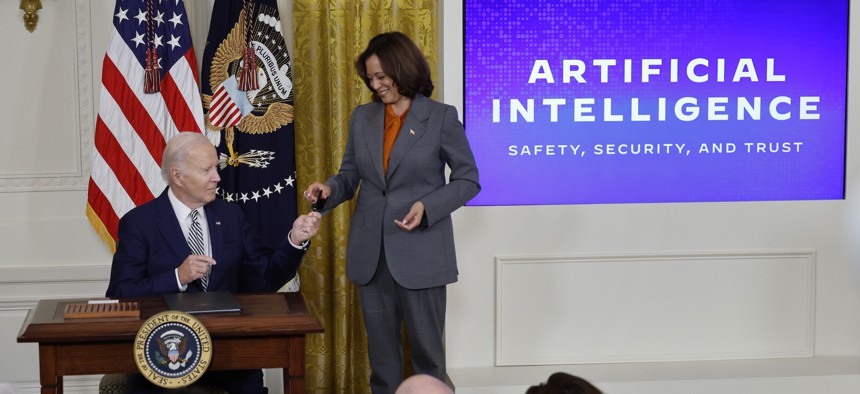Biden signs AI order but stresses need for legislation

President Joe Biden hands Vice President Kamala Harris the pen he used to sign a new executive order on artificial intelligence in the East Room of the White House on October 30, 2023. Chip Somodevilla/Getty Images
The long-anticipated executive order on artificial intelligence is broad, detailed and expansive, but the White House wants Congress to do more.
President Joe Biden described his executive order on artificial intelligence as "the most significant action any government anywhere in the world has ever taken on AI safety, security and trust," in remarks at the White House today.
But he and other leading policymakers are already saying it's not enough.
Outside the White House today, Senate Majority Leader Chuck Schumer told reporters that legislation will "cement what the president has done but also expand it and enhance it in ways that an executive order can't."
Biden is hosting a White House meeting on Tuesday with congressional leaders, including Schumer, to advance such bipartisan AI safety legislation.
The 111-page order is ambitious and detailed. It spells out interim technical standards to be used to assess potential cybersecurity risks of AI models based on compute power and hardware specifications. The order even taps the Defense Production Act to require companies to share AI model testing and training data with government agencies under certain circumstances. But as Schumer and others have pointed out, executive authority is limited when it comes to regulating private companies.
Legislation is needed, Schumer said, "to make sure everyone obeys it — not just people who have contracts with the government"
For federal agencies, the order represents a massive effort to develop standards for AI safety and to identify potential risks in critical infrastructure and advanced research, where rogue or unchecked AI applications could fuel cyberattacks, mayhem in financial markets and even the engineering of dangerous bioweapons. The Departments of Homeland Security, Commerce, Treasury, State, Defense and others have long to-do lists to comply with the order over the next two years.
But the order isn't just about identifying risks — it's also about identifying opportunities.
The Biden administration is directing the Technology Modernization Fund to work over the next 30 days on increasing agency investments in generative AI for federal service delivery. The order also sets a 90-day clock for developing a process to authorize generative AI chat, coding and debugging applications to operate on federal systems. The order also encourages government tech officials to prioritize the authorization of generative AI apps for use in federal systems.
Additionally, the order looks to advance agency access to AI products and services through streamlined acquisition. The General Services Administration is tasked with leading a process that includes a governmentwide playbook for AI acquisition, as well as the inclusion of AI applications on leading tech contract vehicles.
The order also lays out a multi-step plan for increasing opportunities inside government for AI specialists through new pay authorities and new training and recruitment policies.






